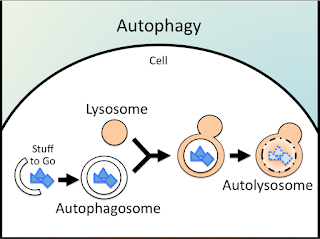 |
| The Iron Horse, Lou Gehrig (1903-1941) |
There are two forms: familial (inherited) and sporadic (non-inherited). Only about 5% of cases are inherited.
In both types of ALS, motor neurons (the nerve cells involved with voluntary movement) have misfolded protein accumulations in them which cause the cells to die. In sporadic ALS, TDP-43 is the problematic abnormal protein 80-90% of the time.
Normally, cells can degrade unwanted proteins. There are several mechanisms for this, including one called AUTOPHAGY (derived from Greek: auto ("self") + phagein ("to eat")):
 |
| Nerdy PowerPoint slide I made. Lysosomes contain acidic digestive enzymes (like your stomach). Lysosomes fuse with autophagosomes full of stuff a cell no longer needs and breaks that material down. |
In ALS and the related disease Frontotemporal Lobar Dementia (FTLD), researchers have shown that build up of abnormal TDP-43 is due to a failure of autophagy.
Scientists from Taiwan are researching ways to turn autophagy back on in ALS and FTLD. In a recent article, they described how they used chemicals, including the commercially-available drugs tamoxifen (a hormonal drug used to treat breast cancer), rapamycin (used to prevent transplanted organ rejection, and also as a coating for cardiac stents) and carbamazapine (an anti-seizure medication) to stimulate autophagy in mice with FTLD. By doing this, the amount of undigested TDP-43 in nerve cells decreased, and there was less nerve cell death. This translated into improved strength and memory in the mice.
But veterinary neurologists are not the only people who should find this heartening: I personally know someone with ALS who is being treated with off-label tamoxifen (along with creatine supplementation).
I searched www.clinicaltrials.gov and found two trials studying tamoxifen in ALS. One completed accrual in 2008. I could not find any reported results in PubMed or by Googling the terms "amyotrophic lateral sclerosis" and "tamoxifen." I could not find any posted trials of rapamycin for ALS.
Of interest, protein accumulation due to impaired autophagy may also be relevant in three other neurologic diseases: Huntington's Disease, Parkinson's Disease, and Alzheimer's Dementia. So figuring this out could potentially help a lot of people.
As "autophagic therapy" (I couldn't make that up) for each of these diseases and ALS is explored, one challenge researchers will face is proving that the treatment is doing what they think its doing (i.e., stimulating autophagy), even if it works to slow or halt disease. I guess that would be a good problem to have, though....

Has the tamoxifen and creatine helped?
ReplyDeleteBOB